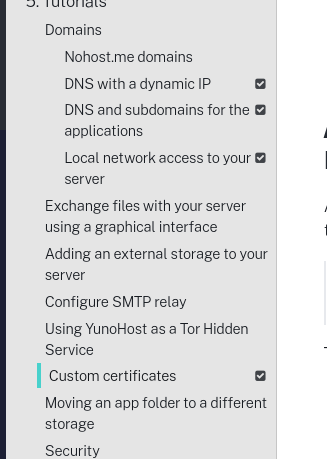serhii.net
In the middle of the desert you can say anything you want
-
Day 1373 (05 Oct 2022)
Python raise_or_log function
Neat snippet I just wrote that will get rid of a lot of duplicated code:
def exception_or_error( message: str, fail_loudly: Optional[bool] = False, exception_type: Optional[Type[Exception]] = ValueError, ) -> None: """Log error or raise an exception. Needed to control the decider in production.""" # Raise whatever exception if fail_loudly: raise exception_type(message) else: logger.error(message)Usage:
are_we_in_production = True # will log or raise a ValueError based on the above exception_or_error("File not found", fail_loudly=are_we_in_production) # if raising something, will raise a KeyError exception_or_error("Row not in db", fail_loudly=are_we_in_production, exception_type = KeyError)
-
Day 1369 (01 Oct 2022)
Using cloudflared tunnels as proxy in docker
cloudflared: image: cloudflare/cloudflared:latest command: tunnel run environment: - TUNNEL_TOKEN=my-super-secred-tunnel-token restart: unless-stopped network_mode: "host"Then whatever can run in its network with bridge driver:
networks: nextcloud: driver: bridge .... services: nextcloud: networks: - nextcloud ports: - "1234:80"And then in the cloudflare zero trust UI add a tunnel from
localhost:1234.Neat thing is that tunnel type HTTP refers to the connection to the host running
cloudflared, but the thing is accessible through cloudflare’s servers as both http and https. No need to manually do any certs stuff!
self-hosting with docker compose resources
- General:
- https://fleet.linuxserver.io/ has a list of docker images of things, not necessarily for self-hosting
- List of docker-compose examples for various self-hosting-relevant apps: petersem/dockerholics: Apps and examples from the Dockerholics group.
- Specific services:
- bitwarden-rs / vaultwarden:
- Their example w/ caddy for domain name: Using Docker Compose · dani-garcia/vaultwarden Wiki
- Generally their wiki is excellent: Home · dani-garcia/vaultwarden Wiki
- bitwarden-rs / vaultwarden:
frp proxy using docker (-compose)
Wanted to run frp’s client frpc with docker to forward the SSH port.
Main issue was binding to a port already open on the host, and one not controlled by a docker thing.
My first attempt led to this: “: Error starting userland proxy: listen tcp4 0.0.0.0:22: bind: address already in use”
After looking around the Internet, found a solution.
Docker’s
docker-compose.yml:services: frpc: image: chenhw2/frp restart: unless-stopped environment: - ARGS=frpc volumes: - ./conf/frpc.ini:/frp/frpc.ini network_mode: "host" ports: - "22:22"The key being the “nertwork_mode” part.
Neither frp server nor client configs needed anything special.
Strangely , I didn’t even need to set any capabilities like I did for dns:
services: dns: restart: always image: strm/dnsmasq volumes: - ./conf/dnsmasq.conf:/etc/dnsmasq.conf ports: - "53:53/udp" cap_add: - NET_ADMIN
You can use screen or tmux for your normal editing things
This goes into “things you’re allowed to do” (Previously: List of good things - serhii.net) territory, but:
- previously, screen/tmux’s use case was “ssh into a server far away and let things run even when your SSH session disconnects”
- had two terminals open on a remote server, had to edit the exact two files every time, over days and disconnections
- just realized that I can just have a screen session open with vim and the files I edit, and just attach to it next time I’d doing something on that server, whenever that is!
- General:
-
Day 1367 (29 Sep 2022)
Debian linux install hangs on configuring network + debugging linux install issues
- Allegedly happens when the network is misconfigured.
- Since a black screen issue I religiously
md5sumthe ISOs, otherwise that would’ve been the prime suspect
- Since a black screen issue I religiously
- In my case I had port forwarding and DMZ and ipv6 configured in the router, disabling all of that fixed the installation issues
- To debug installation issues,
<Ctrl-Shift-F2>to go to the tty andcat /var/log/sysloglessis not installed butnanoistty4has live running logs- that are nice for non-graphical install and “is it doing anything now?”
Burn iso onto usb with dd
I always look in zsh history for this string:
sudo dd if=/path/to/debian-live-11.5.0-amd64-cinnamon.iso of=/not/dev/sda bs=1M status=progress/dev/sdais the usb drive, will be ofc. deleted fully; not a partition like/dev/sdaXbut the actual/dev/sdadisk itself.I specifically added
/not/dev/sdaat the beginning for systems where I have not set upunset zle_bracketed_pasteand that might press enter on paste or after I edit the .iso but notof. That way I’m forced to think when editingof.
- Allegedly happens when the network is misconfigured.
-
Day 1365 (27 Sep 2022)
Python typing annotating functions and callables
For functions/callables,
Callableis not the entire story: you can annotate the arguments and returns values of these callables!From mypy documentation:
The type of a function that accepts arguments
A1,…,Anand returnsRtisCallable[[A1, ..., An], Rt]."You can only have positional arguments, and only ones without default values, in callable types
Python blending abstractmethod and staticmethod (or other decorators)
If your
@abstractmethodshould also be a@staticmethod, you can happily blend both, as long as the@staticmethod(or other) decorator comes first.In other words,
@abstractmethodshould always be the innermost decorator.1
-
Day 1363 (25 Sep 2022)
Yunohost UX show read articles
The Yunohost documentation adds checkmarks to articles you already read, I love this. Not to track progress, but to quickly parse the list and find the 4 articles I keep reading.
